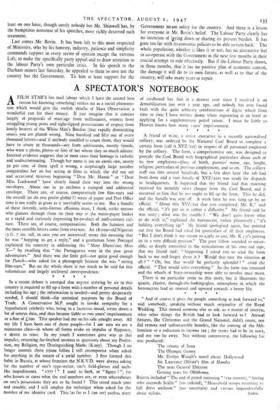A friend of mine, a senior executive in a recently
nationalised colliery, was ordered by the National Coal Board to complete a certain form (call it XYZ/ tot) in respect of all personnel employed by the colliery. The form, a comprehensive one, was designed to provide the Coal Board with biographical particulars about each of its new employees—place of birth, parents' name, age, height, religion, particulars of previous employment, and so on. The colliery staff ran into several hundreds, but a few days later the job had been done and a vast bundle of XYZ/tots was ready for dispatch to headquarters. It happened that my friend had that morning received his monthly salary cheque from the Coal Board, and it occurred to him that he too ought to fill up the form. This he did, and the bundle was sent off. A week later he was rung up by an official. " About this XYZ/ tot that you completed, Mr. K," said the official, " it's put us in rather a difficulty." My friend said he was sorry ; what was the trouble ? " We don't quite know what to do with it," explained the bureaucrat, rather plaintively ; " it's holding everything up." My friend apologised again, but pointed out that the Board had asked for particulars of all their employees. " But I don't think it was meant to apply to you, Mr. K ; it's putting us in a very difficult position." The poor fellow sounded so miser- able, so deeply enmeshed in the reticulations of his own red tape, that my friend said : " Supposing I asked you to send the form back to me and forget about it ? Would that ease the situation at all ? " " Oh, but that would be perfectly splendid ! " cried the official. "That would solve everything." So the form was returned and the wheels of State-ownership were able to revolve once more.
There is no particular point to this story, but it illustrates the quaint, elusive, through-the-looking-glass atmosphere in which the bureaucrats lead us onward and upward towards a better life. * *


































 Previous page
Previous page